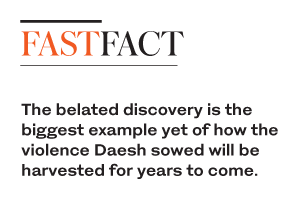Ethnic Tubus fear southern Libya offensive
OUBARI: In the southern Libyan city of Oubari, shops are shuttered and tension is palpable, as residents fear an imminent incursion by forces loyal to strongman Khalifa Haftar.
We “dread the repercussions of military operations that are unfolding on the edge of town,” said 22-year-old hospital administrator Ali Senoussi, speaking on behalf of his Tubu community.
Many residents in Oubari — some 900 kilometers (560 miles) south of Tripoli — are Tubu.
The ethnic group fears vengeance by Arab communities that have joined an offensive by Haftar’s self-styled Libyan National Army (LNA), which is on the outskirts of the city.
Long marginalized, Tubus live in the Tibesti region, which straddles Libya, Chad and Niger, an area long at the mercy of roaming rebel groups, traffickers and extremists.
“We are residents of this region. Our support and love for it is immense,” said 22-year-old Senoussi, clothed in a traditional head robe to screen desert sun and wind.
“We cannot accept being involved in wars with Arab tribes that fight alongside Haftar,” he insisted, sipping tea in the courtyard of a hospital where he works as an administrator.

The LNA says it is seeking to purge “terrorist and criminal groups,” and some accuse the Tubus of supporting Chadian rebels.
But Senoussi dismisses the offensive as “a threat to the social peace of the whole region.”
Tubu lawmakers even allege that ethnic cleansing is under way.
The community was among the first to join the 2011 uprising that ousted and killed Muammar Qaddafi.
But the former dictator’s downfall by no means improved Tubus’ standing in Libya.
Despite being home to some of the country’s biggest oilfields, the region is regularly hit by shortages of all kinds — petrol, electricity, gas cylinders and even bread.
Prices have rocketed on the black market.
Senoussi said the lack of fuel had forced him to leave his car at home and walk to work.
“Most public sector workers prefer to walk” to avoid long queues that have become a fixture of daily life at gas stations, he said.
The intensified chaos of recent years means that the southern border areas are more than ever a haven for extremists, traffickers and rebels.
These groups exploit a security vacuum that is exacerbated by an ongoing power struggle between a UN-backed Government of National Accord in Tripoli and a rival administration loyal to Haftar in northeastern Libya.
Tribal and ethnic quarrels between the Tubus, Tuaregs and Arab groups over trafficking have added fuel to the fire.
“We are Muslims, but we have a culture and language that we share with our cousins from Chad, Niger and Sudan,” explained Ali Yahyia, a Tubu expert on his community.
But this does not undermine “our support for the Libyan homeland,” he insisted.
The LNA launched its ongoing military campaign in mid-January and on Wednesday night entered Murzuk, another southern Libyan city home to many Tubus.
Renowned for a fortress that dates back more than seven centuries, much of the historic settlement now resembles a ghost town.
Murzuk’s windswept streets are littered with garbage.
Like Oubari, shops are closed and people are scared to circulate.
Even bakers — hit by a lack of flour — cannot raise their blinds.
“The city faces numerous problems at the service level, particularly at the hospital where we have only one doctor,” deplored municipal councillor Ibrahim Omar.
“With the military operations that are ongoing, the doctors refuse to come, fearing for their lives,” he said.
If the situation persists, “food stocks will in the end be exhausted.”

Libyans, to varying degrees, celebrate 2011 uprisingSecurity chief in south Libya town assassinated: ministry



 “These are individual graves, but behind us, by the trees, are the mass graves of those executed by Daesh,” said Asaad Mohammad, the 56-year-old forensic assistant at the site.
“These are individual graves, but behind us, by the trees, are the mass graves of those executed by Daesh,” said Asaad Mohammad, the 56-year-old forensic assistant at the site.